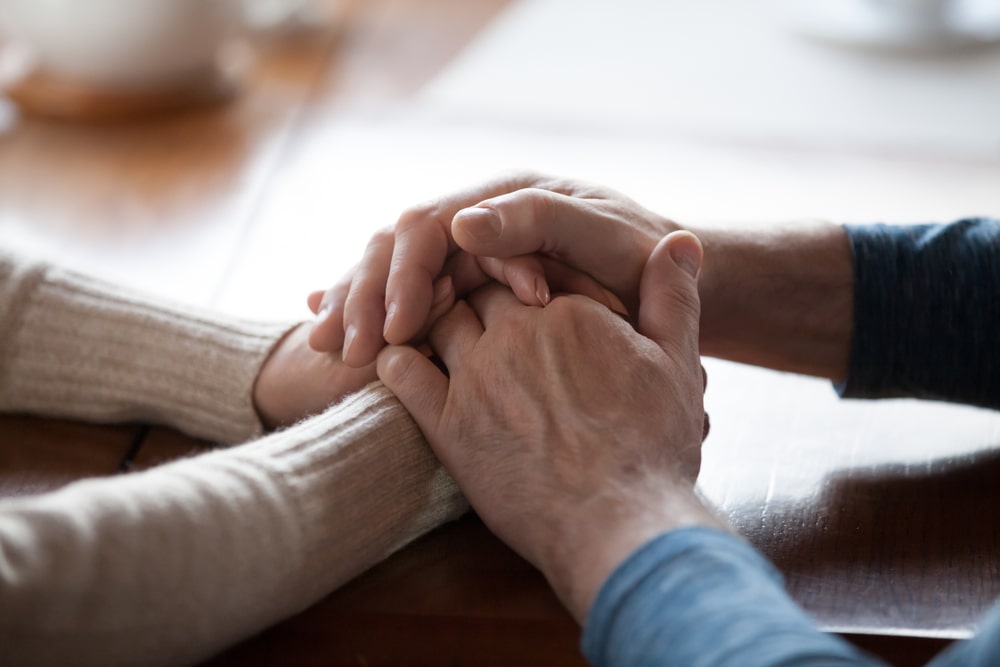If you’ve had to deal with a difficult relationship with a close friend or family member, you’re not alone. Many of us know the pain associated with tense relationships such as arguments, hurtful comments, and even estrangement in some cases. Did a face just pop into your mind? It could be anyone – a parent, a spouse (or former spouse), a sibling, a child, or even a friend. The person and the circumstances differ, but we can all relate to the stress associated with difficult relationships. Oftentimes, the relationships that hurt us most are the ones that are close to us (e.g. family). Those are the relationships that are supposed to support us during hard times and enrich our lives, but in many cases, they don’t.
So, what happens when that person who brought pain to your life dies? In many cases, grief can be compounded by sadness over what might have been. This article will share a few ideas for coping with grief after the loss of a difficult relationship.

So, what happens when someone who has hurt you dies?
When the relationship was strained, you may have contradictory, negative, or unexpected emotions after the death of someone close to you. In addition, you may not know how to deal with these contradictory emotions. Perhaps you feel relieved but deeply sad or disappointed at the same time. You may feel like this person let you down because they didn’t try harder to mend the relationship. Or maybe you feel guilty for avoiding the person because of a negative experience. Alternatively, you may feel so angry that you convince yourself that you are glad the person is no longer around. This may sound quite harsh, but for some, the relationship was so hurtful or abusive that the person left behind cannot access feelings of compassion or sadness at the loss.

While all grief is hard work, in many ways, dealing with the loss of a difficult relationship can be harder for the survivors to process. This happens for many reasons, but one of the most common is because of the deep pain associated with the relationship. Additionally, the survivor may have held onto hope that the relationship would change for the better, but with death, that hope is lost. Even though the relationship brought deep pain (and possibly anger), most of us still wish things could have been different, but death ends the possibility for change.
Difficult relationships bring up complicated emotions
Some of these examples may resonate with you:
- Numbness; not knowing if what you’re feeling is actually grief
- Feelings of relief, which may seem inappropriate and abnormal (though they aren’t)
- An absence of sadness, though you can see that others are sad
- Finding it difficult to accept that the person is gone and any hope for reconciliation is gone, too
- Feelings of grief even though others may think you shouldn’t grieve the loss
- A lack of closure even though you thought the person’s death would not affect you
- Feeling guilty that you didn’t try harder to have a better relationship while the person was alive
- Anger that the person took something precious from you (i.e. a happy childhood, good self-esteem, a healthy, loving relationship)
- Feeling justified in your anger against the person who has died

This is not a complete list. You may be feeling something entirely different, but please know that whatever you’re feeling, it’s normal. People experience a wide range of emotions when someone dies, whether the relationship was difficult or not: explosive emotions, numbness, anger, shock, disappointment, relief, sadness, to name a few. No matter how you feel, the most important thing is to process through your emotions and move forward. You must work hard to prevent destructive emotions and thoughts from festering inside you, which is far more likely to occur when the person who has died represents a source of pain.
Why you should allow yourself to grieve for people who have hurt you?
Simply put, you need to work through all the feelings of grief for your own well-being. Oftentimes, those who never deal with the pain and wrongdoing done to them end up as hurting, broken, and sometimes angry, people. In some cases, they themselves become the “difficult person” in someone else’s life, and the cycle continues. Those of us who have dealt with a long-term difficult relationship need to realize that there is deep emotional baggage to unpack, which doesn’t end simply because the person who inflicted it is dead. We must still learn how to reconcile with our past and move forward toward the future in a healthy way.

A few tips on moving forward with grief
To unpack all of the conflicting emotions that you are experiencing, take some time to try to name your feelings and then begin to process through them. First of all, give yourself permission to grieve, no matter what that looks like. As you process the loss of this person, here are some thoughts on how to unpack the complex emotions you may be feeling:
1. Process what happened
“Mourners must go backward before they can go forward.” – Dr. Alan Wolfelt, grief counselor, author
It’s important to understand that trauma can come directly from negative experiences (i.e. hurtful words, actions, and abuse) and indirectly from a lack of positive experiences (i.e. affirming words, expressed love and affection, and quality time). So, for example, if most people saw that you had a good father who provided for his family, but he never hugged you or told you he loved you, then you might feel the conflict resulting from indirect trauma. Here are a few ideas to help you process what happened:
- Acknowledge the pain that you experienced and allow yourself to validate the pain without minimizing what happened.
- List out all the emotions that you feel, without judgment.
- Journal about the experience you are going through. Share what you do miss about the person, what you don’t, what you wish the relationship had been like, and what it actually was like. A journal is a safe place to externalize your emotions, which is necessary to grieve well.
- Talk about the difficult relationship – the good, the bad, and the ugly – with a safe person such as a spouse, friend, or counselor. Use this time to process what you feel, both relating to the recent death but also relating to previous tensions or trauma. It’s the unsaid stories that can do the most damage, so even if you are angry, put it into words. Don’t hold those painful thoughts and emotions inside.

2. Mourn for what was lost
“For all sad words of tongue and pen, The saddest are these, ‘It might have been’.” -John Greenleaf Whittier, American poet
Mourning is the external expression of internal grief. Expressing grief externally through mourning helps us to move forward in our grief journey. When we lose someone with whom we had a painful, difficult relationship, the process of mourning may be a little different. Here are a few examples of what mourning a difficult relationship may involve:
- Allow yourself to mourn for what might have been. Grieve for the child that felt lonely, hurt, and alone. Grieve for the hugs and kisses and comforting words that didn’t come. Allow yourself to cry, not necessarily for the person who hurt you, but for the pain you endured.
- Turn anger at the other person into compassion for yourself. As a wounded person, you are likely angry at the person who hurt you. However, anger will not help you heal. Instead, turn your anger at the other person into compassion for yourself. Tell that hurting child or young person inside you what you wish you had heard from other adults in your life. For example, “You didn’t deserve to be treated that way,” or “You are worthy of love and affection.” When you treat yourself with compassion, you give yourself a gift the other person couldn’t.
- You can also try writing a letter to the person who has died to tell them everything that was left unsaid. Just because one party is gone doesn’t mean that you can’t still reconcile yourself to the loss. Tell the person exactly how their actions made you feel to get it all out. This is about you and your life, your healing, and your future. There are no longer any feelings to hurt or consequences to fear. Say what needs to be said so you can heal.

3. Choose to forgive
“Hatred is the rabid dog that turns on its owner. Revenge is the raging fire that consumes the arsonist. Bitterness is the trap that snares the hunter.” – Max Lucado
Finally, forgive, even when it feels impossible. Think of forgiveness as something you are doing for you, not for the other person. Release yourself from having to carry the burden of anger and bitterness. Only then can you release the hold they have on your life and emotions. By forgiving, you can find the peace you’ve been searching for. Remember:
- Forgiveness is for your own well-being
- The process of forgiveness can take time
- Forgiveness does not excuse the behavior of the other person
- Forgiving someone begins as a choice, not a feeling
- Prayer, guided meditations, or deep breathing can help you focus on releasing feelings of anger and bitterness and receiving feelings of compassion and empathy for yourself and others
Do it for you
There are no perfect relationships. In fact, at some point, even the best of relationships will experience misunderstandings, moments of pain, or a few harsh words. For some, deep down, you really did love the difficult person in your life, and you are sad for the relationship that never was. For others, years of harsh words and painful interactions have encouraged you to build a protective wall around yourself. Even now, you’re not sure how to take it down (or if you even want to). No matter where you fall, at some point, you felt love toward the difficult person in your life or desired love from them. While it is a greater challenge to forgive and grieve a person who brought you pain, once you’ve done it, you will experience a freedom you’ve not known before.




